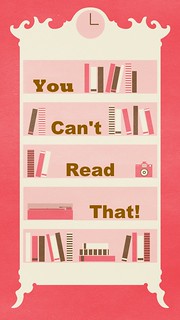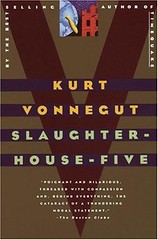 You Can’t Read That! is a periodic post featuring banned book reviews and news roundups.
You Can’t Read That! is a periodic post featuring banned book reviews and news roundups.
YCRT! News:
Fascinating discussion about the key figures involved in comic book censorship in the 1950s.
“Simply put, I do my best to keep errors of fact off the letters page; when one does run, a correction is published … [s]aying ‘there’s no sign humans have caused climate change’ is not stating an opinion, it’s asserting a factual inaccuracy.” The Los Angeles Times will no longer print letters to the editor from climate change deniers.
Parents complain Amazon’s Kindle Fire gives kids access to porn, accounts.
The power of public shaming: the Louisiana parish school that banned To Kill a Mockingbird, mentioned in my last YCRT! post, has lifted the ban.
More than a year after Tucson schools banned them, seven Mexican-American studies books are back on school library shelves. Naturally, the Arizona Education Department is unhappy with the Tucson school district for reinstating the books. Stand by for round #2.
Texas town arrested and jailed a man for an overdue library book.
“Viewpoint censorship” on Facebook? I’m not buying it. Sounds like old religious-right “persecuted Christians” narrative to me. Very surprised the Washington Post fell for this crap.
#hashtag censorship! What will they think of next?
The intellectual underpinnings of the movement to defund libraries: “They’re teaching Mexicans how to speak English. Let that son of a bitch go back to Mexico. There’s just so many things they’re doing that I don’t agree with. …Them junkies and hippies and food stamps [recipients] and all, they use the library to look at drugs and food stamps [on the Internet]. I see them do it.”
Doth thy dictionary offend thee? Cast it from thee!
“Do not apologize for policies that are designed to uphold intellectual freedom, users’ privacy, and access to a diverse range of ideas.” From an American Library Association list of tips for libraries under fire.
“But Pullman opened this door for me, a decade before my university professors would address these very same concepts.” A rousing endorsement of Philip Pullman’s His Dark Materials trilogy.
“When I started to write, it was the ’70s, and throughout that decade, we didn’t have any problems with book challenges or censorship. It all started really in a big way in 1980 … it came with the election, the presidential election of 1980, and the next day, I’ve been told, the censors were crawling out of the woodwork and challenging, like, ‘It’s our turn now, and we’re going to say what we don’t want our children to read.'” Judy Blume talks about book banning.
YCRT! banned book review:
 Slaughterhouse-Five
Slaughterhouse-Five
Kurt Vonnegut
Let’s start with a brief history of prior Slaughterhouse-Five banning, compiled by the American Library Association:
Challenged in many communities, but burned in Drake, ND (1973). Banned in Rochester, MI because the novel “contains and makes references to religious matters” and thus fell within the ban of the establishment clause. An appellate court upheld its usage in the school in Todd v Rochester Community Schools, 41 Mich. App. 320, 200 N. W 2d 90 (1972). Banned in Levittown, NY (1975), North Jackson, OH (1979), and Lakeland, FL (1982) because of the “book’s explicit sexual scenes, violence, and obscene language.” Barred from purchase at the Washington Park High School in Racine, WI (1984) by the district administrative assistant for instructional services. Challenged at the Owensboro, KY High School library (1985) because of “foul language, a section depicting a picture of an act of bestiality, a reference to ‘Magic Fingers’ attached to the protagonist’s bed to help him sleep, and the sentence: ‘The gun made a ripping sound like the opening of the fly of God Almighty.”‘ Restricted to students who have parental permission at the four Racine, WI Unified District high school libraries (1986) because of “language used in the book, depictions of torture, ethnic slurs, and negative portrayals of women.” Challenged at the LaRue County, KY High School library (1987) because “the book contains foul language and promotes deviant sexual behavior.” Banned from the Fitzgerald, GA schools (1987) because it was filled with profanity and full of explicit sexual references:’ Challenged in the Baton Rouge, LA public high school libraries (1988) because the book is “vulgar and offensive:’ Challenged in the Monroe, MI public schools (1989) as required reading in a modem novel course for high school juniors and seniors because of the book’s language and the way women are portrayed. Retained on the Round Rock, TX Independent High School reading list (1996) after a challenge that the book was too violent. Challenged as an eleventh grade summer reading option in Prince William County, VA (1998) because the book “was rife with profanity and explicit sex:” Removed as required reading for sophomores at the Coventry, RI High School (2000) after a parent complained that it contains vulgar language, violent imagery, and sexual content. Retained on the Northwest Suburban High School District 214 reading list in Arlington Heights, IL (2006), along with eight other challenged titles. A board member, elected amid promises to bring her Christian beliefs into all board decision-making, raised the controversy based on excerpts from the books she’d found on the internet. Challenged in the Howell, MI High School (2007) because of the book’s strong sexual content. In response to a request from the president of the Livingston Organization for Values in Education, or LOVE, the county’s top law enforcement official reviewed the books to see whether laws against distribution of sexually explicit materials to minors had been broken. “After reading the books in question, it is clear that the explicit passages illustrated a larger literary, artistic or political message and were not included solely to appeal to the prurient interests of minors,” the county prosecutor wrote. “Whether these materials are appropriate for minors is a decision to be made by the school board, but I find that they are not in violation of criminal laws.”
And now, my own review:
The simplest way to convey the essence of Slaughterhouse-Five is to quote Vonnegut’s long title:
Slaughterhouse-Five; or, The Children’s Crusade: A Duty-Dance with Death, by Kurt Vonnegut, Jr., a Fourth-Generation German-American Now Living in Easy Circumstances on Cape Cod (and Smoking Too Much) Who, as an American Infantry Scout Hors de Combat, as a Prisoner of War, Witnessed the Fire-Bombing of Dresden, Germany, the Florence of the Elbe, a Long Time Ago, and Survived to Tell the Tale: This Is a Novel Somewhat in the Telegraphic Schizophrenic Manner of Tales of the Planet Tralfamadore, Where The Flying Saucers Come From
This is a war novel, like Catch-22, that everyone in my college generation read. Everyone. It remains widely read today. In addition to being widely read, it has also been widely challenged and banned, from its publication in 1969 right up to the present day. I hadn’t read it in a long time, but hearing that it had been banned again — this time from high school libraries and reading lists in Republic, Missouri, on the grounds that it isn’t “Christian” — prompted me to re-read it.
Vonnegut’s writing style is simple and sparse, even repetitive. Many readers are put off by Vonnegut’s repetition of the phrase “And so it goes” when characters die, but it is part and parcel of Vonnegut’s quietist philosophy. As for the science-fiction aspects of the novel, I personally think the best way to interpret the Tralfamadorians and their way of perceiving time and death is as a manifestation of Billy Pilgrim’s post-traumatic stress … Vonnegut strongly hints at that himself.
Many books on high school reading lists contain salty language and some address sexuality, two elements present in Vonnegut’s story, but few exude as strong an air of existential fatalism as Slaughterhouse-Five. Man will always make war. People will always die, horribly. You can’t fight it. It is what it is. Best to look at life in its entirety, all times visible and occurring at once and forever, and to focus on those times that make us (or made us, or will make us) happy.
Vonnegut’s good-natured fatalism is a direct challenge to Protestant Christianity as it is practiced in America, and though I deplore it, I fatalistically accept the fact that zealots will continue to attack this gentle, peaceful, wry book. It is what it is … and so it goes.
Would I want my high-schooler to read Slaughterhouse-Five? Absolutely. Everyone should read it.